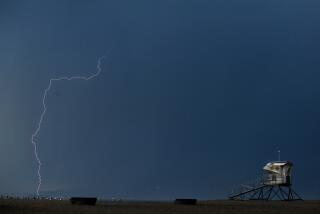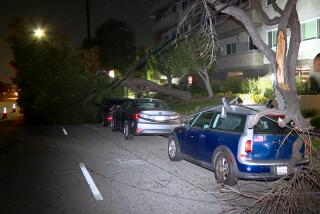Strong Winds Disrupt Power to Thousands
- Share via
Gale-force winds swept down mountain passes into Southern California on Monday, stirring up blinding clouds of dust in Palmdale, knocking out power to thousands of homes in the Antelope Valley and felling tree limbs in the San Gabriel and San Fernando valleys.
The winds, generated by the combined forces of two vast weather systems over New Mexico and the Pacific Northwest, struck first in Las Vegas, toppling a 90-ton crane being used to erect a roller coaster at the Sahara Hotel.
Issuing advisories warning of “the potential for very strong and possibly damaging winds” through this morning, forecasters said it should stay breezy through Wednesday afternoon, not calming down entirely until sometime Thursday. About 1 a.m. Monday, a gust estimated at almost 60 mph knocked over a 250-foot-tall construction crane on the Strip in Las Vegas. The crane, which was not in use at the time, crashed into a parking lot and an adjacent water sports park. No one was injured.
The winds hit the Antelope Valley shortly after dawn, felling power poles and halting traffic in several neighborhoods.
The Los Angeles County Sheriff’s Department received scores of calls from blacked-out residents and from motorists confounded by inoperative traffic signals and swirling dust clouds that reduced visibility to a few feet in some areas.
One wind-tossed car veered off 50th Street and into an onion field. Others pulled to the roadside and waited out the dust flurries.
Sheriff’s deputies directed traffic, while Edison crews straightened utility poles blown down along Palmdale Boulevard.
“All of our available resources [were] dispatched to restore power in those areas as quickly as we could,” said Gil Alexander, a spokesman for Southern California Edison. “That includes borrowing from other areas.”
Streets in the San Gabriel and San Fernando valleys were littered with trash, palm fronds and broken branches Monday afternoon, but there were no reports of structural damage or injury.
Stacey Johnstone, a meteorologist with WeatherData Inc., said Monday’s blasts came from winds circulating counterclockwise around a powerful low-pressure system over New Mexico, reinforced by winds circulating clockwise around a large but less powerful high-pressure system over Washington and Idaho.
“These combined winds, funneling out of the north and northwest, are very strong at upper levels--close to 175 mph at 27,000 feet,” Johnstone said. “Lower down, at some points in the Southern California mountains, there were gusts of 64 mph Monday afternoon.”
Johnstone said the strongest winds, probably close to 70 mph, should hit Southern California’s mountain passes about dawn today.
“The winds will begin to taper off in the afternoon, with a few breezes continuing on Wednesday,” Johnstone said. “After that, things should die down and the weather should be pretty nice, with high temperatures in the coastal valleys in the 70s.”
Winds between 32 and 63 mph are rated as gale force under the commonly used Beaufort scale. Winds between 63 and 73 mph are storm force; winds over 73 mph are hurricane force. The scale is named for the British navigator who devised it in 1806.
More to Read
Sign up for Essential California
The most important California stories and recommendations in your inbox every morning.
You may occasionally receive promotional content from the Los Angeles Times.












